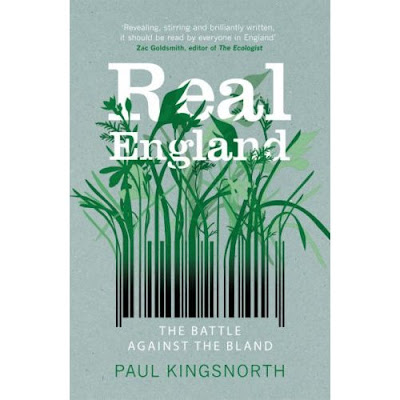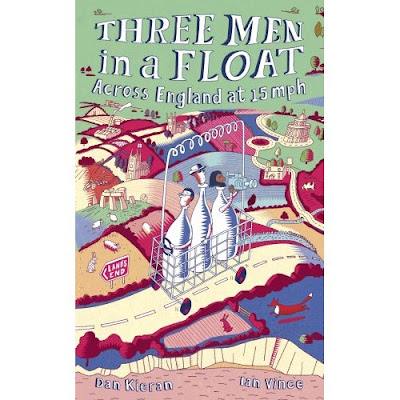One week and two very different books about the current state of England. Both books, although tonally poles apart, look out over the nation’s landscape and it’s national character to draw conclusions about the state of the country in 2008. The end result, with both Guardian/Ecologist writer Paul Kingsnorth’s ‘Real England’ and ‘Three Men In A Float’ by The Idler magazine’s Dan Kieran & Ian Vince, is a snapshot of 21st century Britain, of it’s people and it’s problems, with just a few ideas for how we can club together to alleviate them thrown in.
‘Real England’ seems at times almost ridiculously bleak in it’s overview. The UK’s small businesses, from pubs to farms to shops, are being steamrollered by multinationals. Our government is in collusion with big business, redrawing the maps of city centres and waterways the length of the country, allowing public access to be compromised in favour of new retail developments or apartment blocks. The book points out how we’ve all ignored the problem for too long, ending up in a perilous state where each city centre can be judged on a scale as to whether it’s a ‘clone town’, a ‘home town’ or a ‘border town’. Walking down most British high streets these days, it doesn’t take a maths genius to do the sums there. Local diversity is out, homogeny is in. Although these points alone aren’t exactly news, Kingsnorth’s exploration of the same changes outside of the cities – in the fields, in rural communities and on the village greens – is what makes the book so riveting. Personally, I’d have thought seeing a few organic British apples in Tescos was tantamount to a victory for the farmer and the consumer – here, it’s blindingly obvious that it’s just another marketing tool for supermarkets and that mass production and uniformity is still the order of the day. ‘Real England’ is the furious, non-conformist sibling of the (also essential) ‘England In Particular’ – whereas the latter celebrates the great things we’ve got left to embrace, Kingsnorth spells out exactly how long we’ll have them for unless something fundamental changes in the way we view our country, how the rapidly changing landscape is a danger much the same as climate change – that England in 50 years time might well be unrecognizable, and maybe not just because of the Mediterranean weather we’re being told to expect. Solutions, as ever, come down to personal choice – we have to want change in order for it to happen – if we want to stop the erosion of our national identity, then it’s still out there, you just have to grasp it before it’s just another piece of history, an irrelevance. A brilliant book.
The premise of ‘Three Men In A Float’ is fantastically simple – three men buy a milk float and attempt to drive ‘end to end’ across England (Lowestoft to Land’s End). Along they way, they must rely on the kindness of strangers in order to get a charge for the float, which runs at 15 mph and manages around 30 miles per 8 hour charge. The idea is to discover the country and the character of the people along the way, to see if there really is such a thing as England out there. The trip, which you could probably do in a day if you put your foot down and munched a load of speed, ends up taking them three weeks. Along the way, you start to see the British people as warm and helpful – their task goes from seemingly impossible to deceptively easy – people genuinely seem to want to help. The concept of slow travel is taken to it’s logical extreme – at one point the float is overtaken by a bee. Whatever they may have lost in speed they gain the enviable position of being able to watch hares or red kites from the luxury of a slow moving, virtually silent milk float, a milkman’s eye view of the countryside as it were.
It’s in watching as the English countryside unfurling itself in slow motion in “Three Men…” that the writers draw much the same conclusions at ‘Real England’ – that the people still care about the uniqueness of the country and that this is a place that we need to work at preserving, one with as delicate an eco-system as any coral reef or polar ice cap, one that we are in danger of altering beyond the point of return.
Me, I’m just waiting for someone to do the same kind of thing with Wales…
Robin Turner

